College Professor Resume Examples

Mar 19, 2025
|
12 min read
Master the art of crafting your college professor resume with our step-by-step guide, helping you to lecture the competition and secure your dream job in academia. Transform your credentials into a strong syllabus for success.
Rated by 348 people
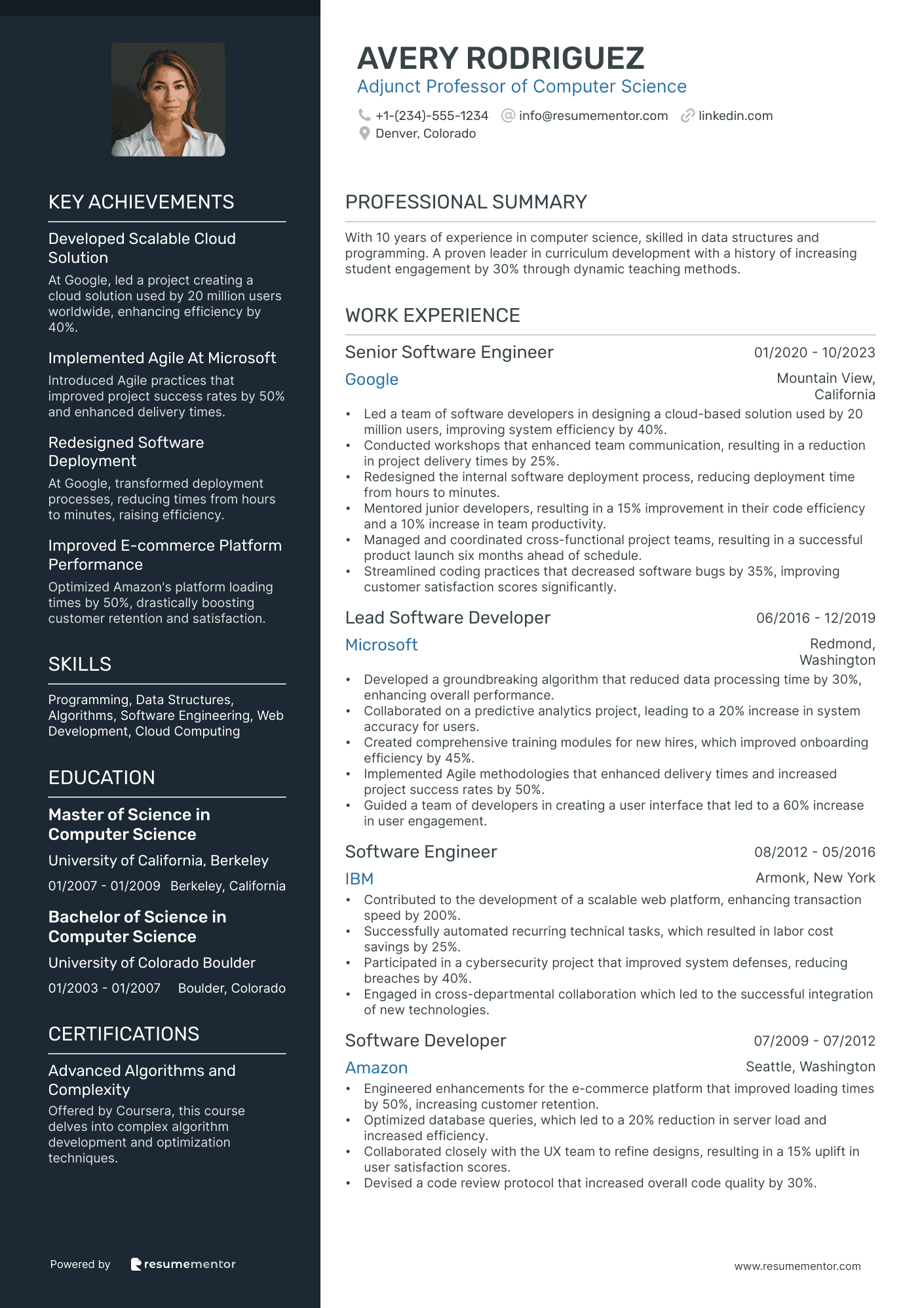
Adjunct Professor of Computer Science
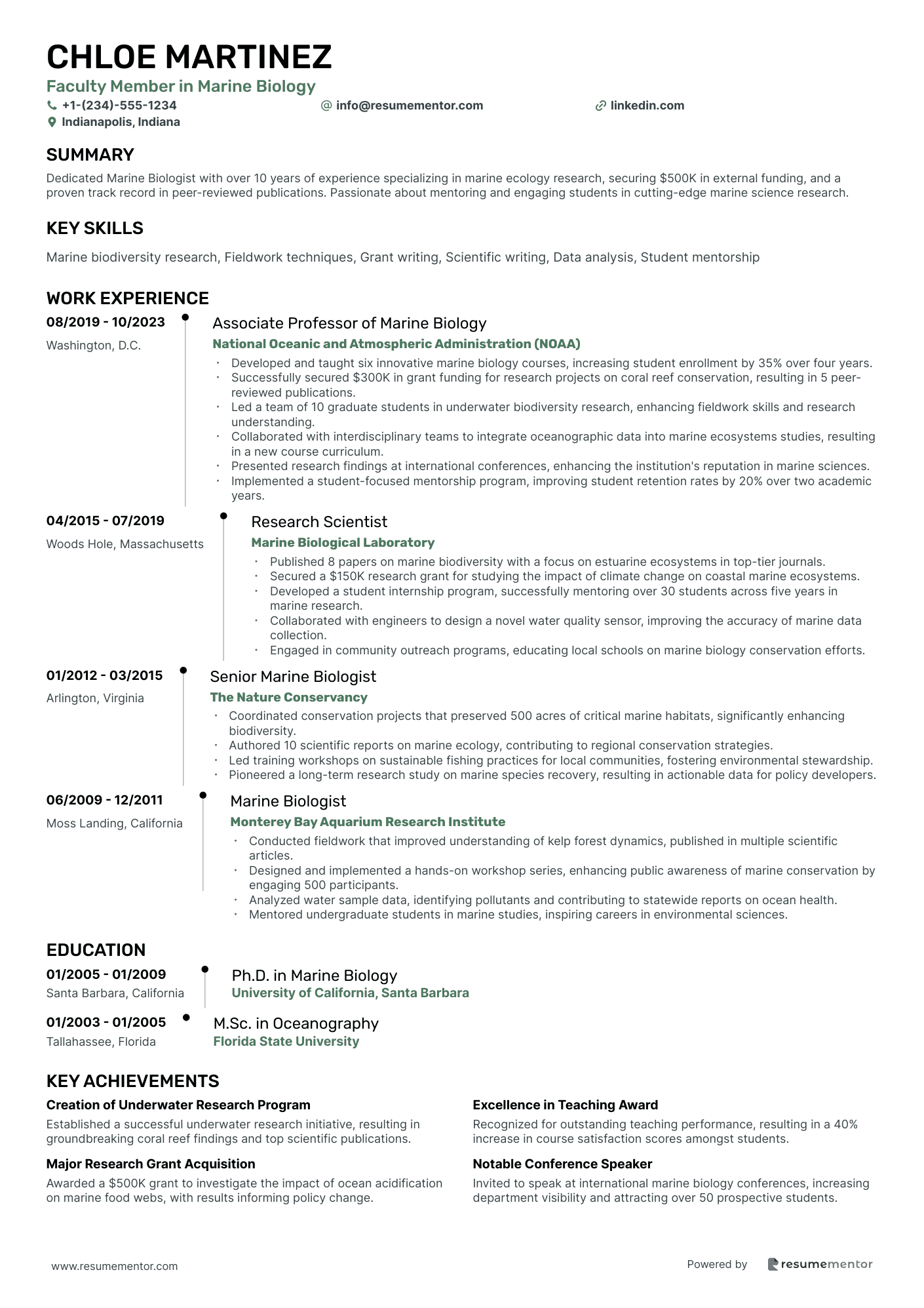
Faculty Member in Marine Biology
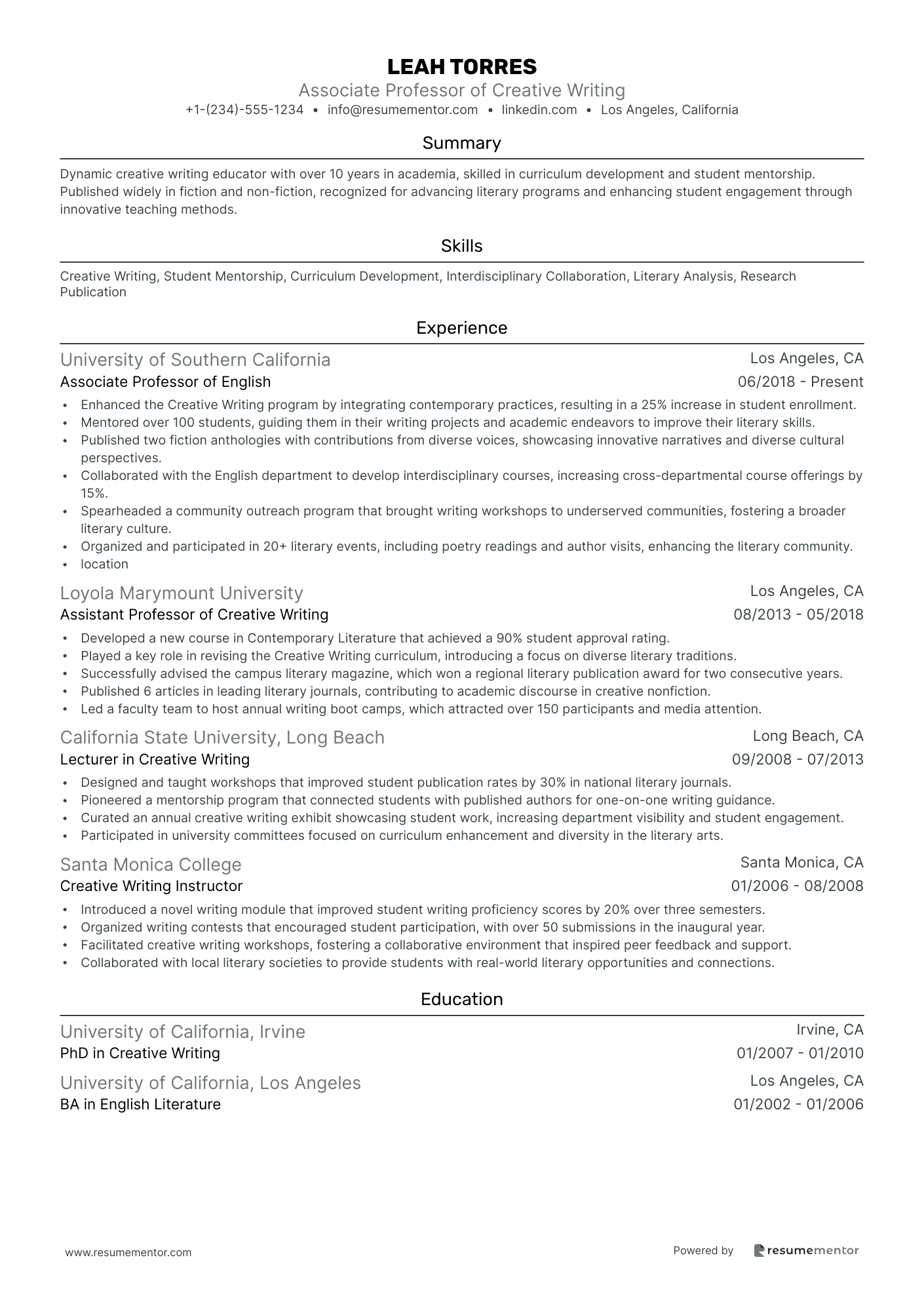
Associate Professor of Creative Writing
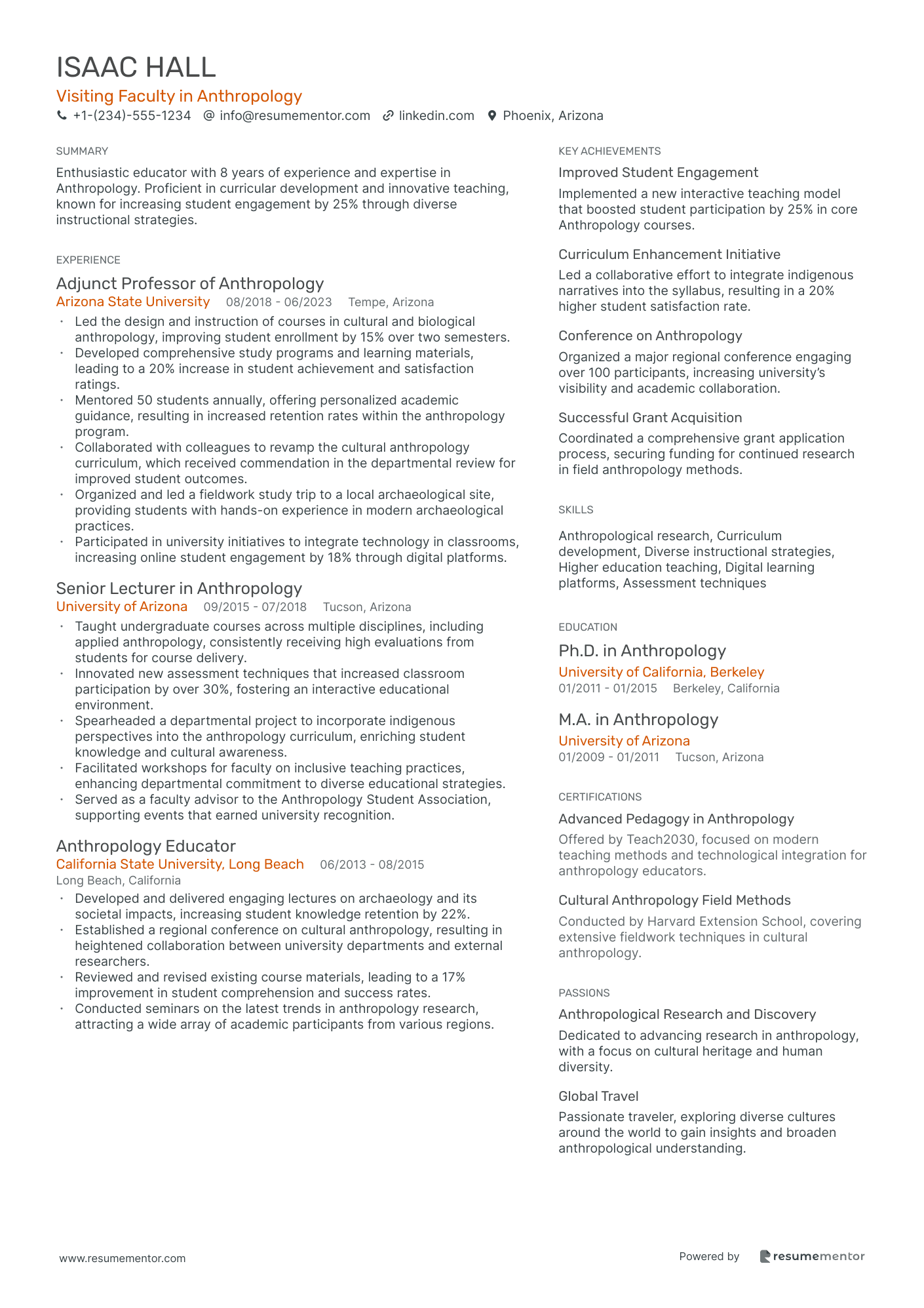
Visiting Faculty in Anthropology
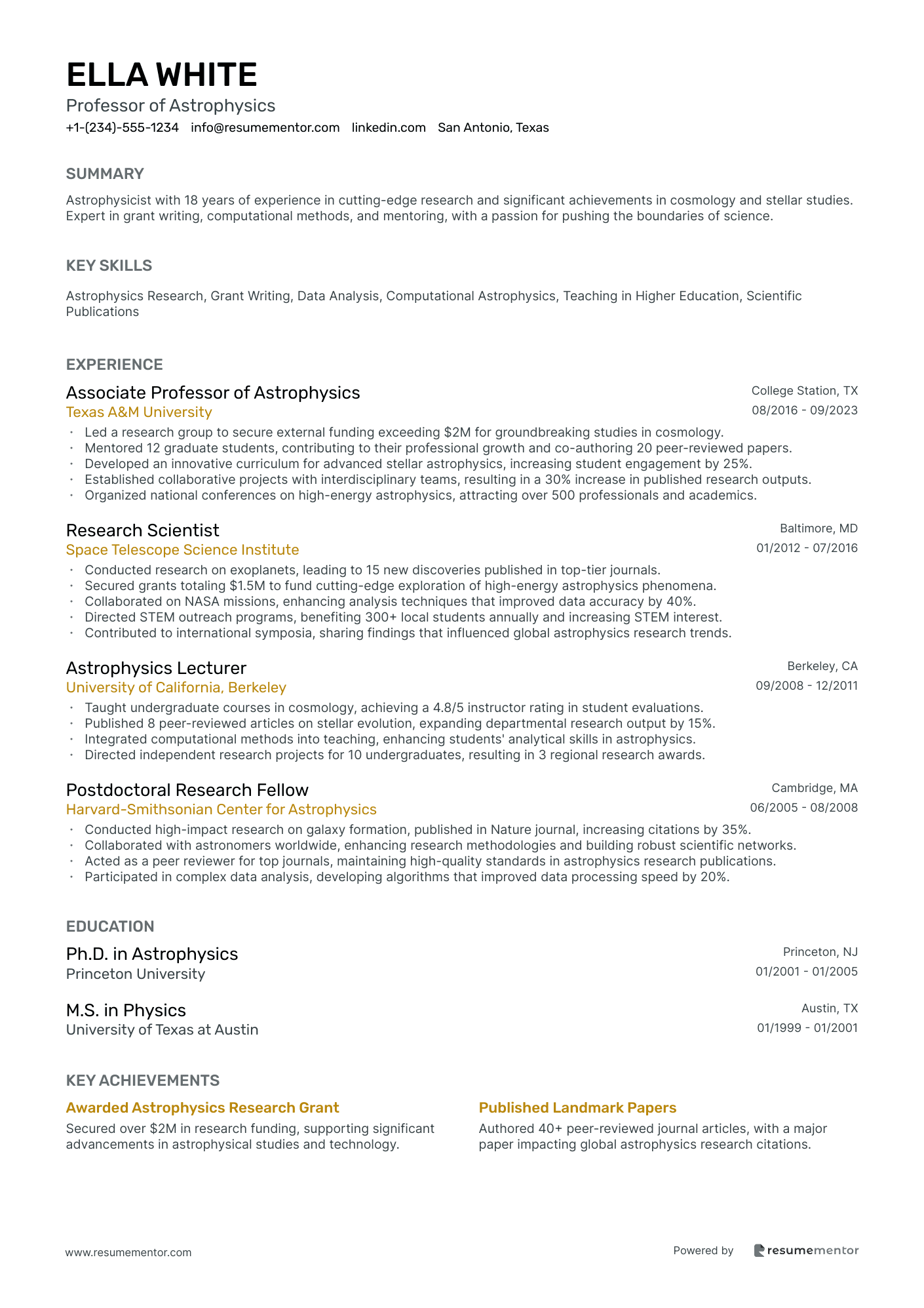
Professor of Astrophysics
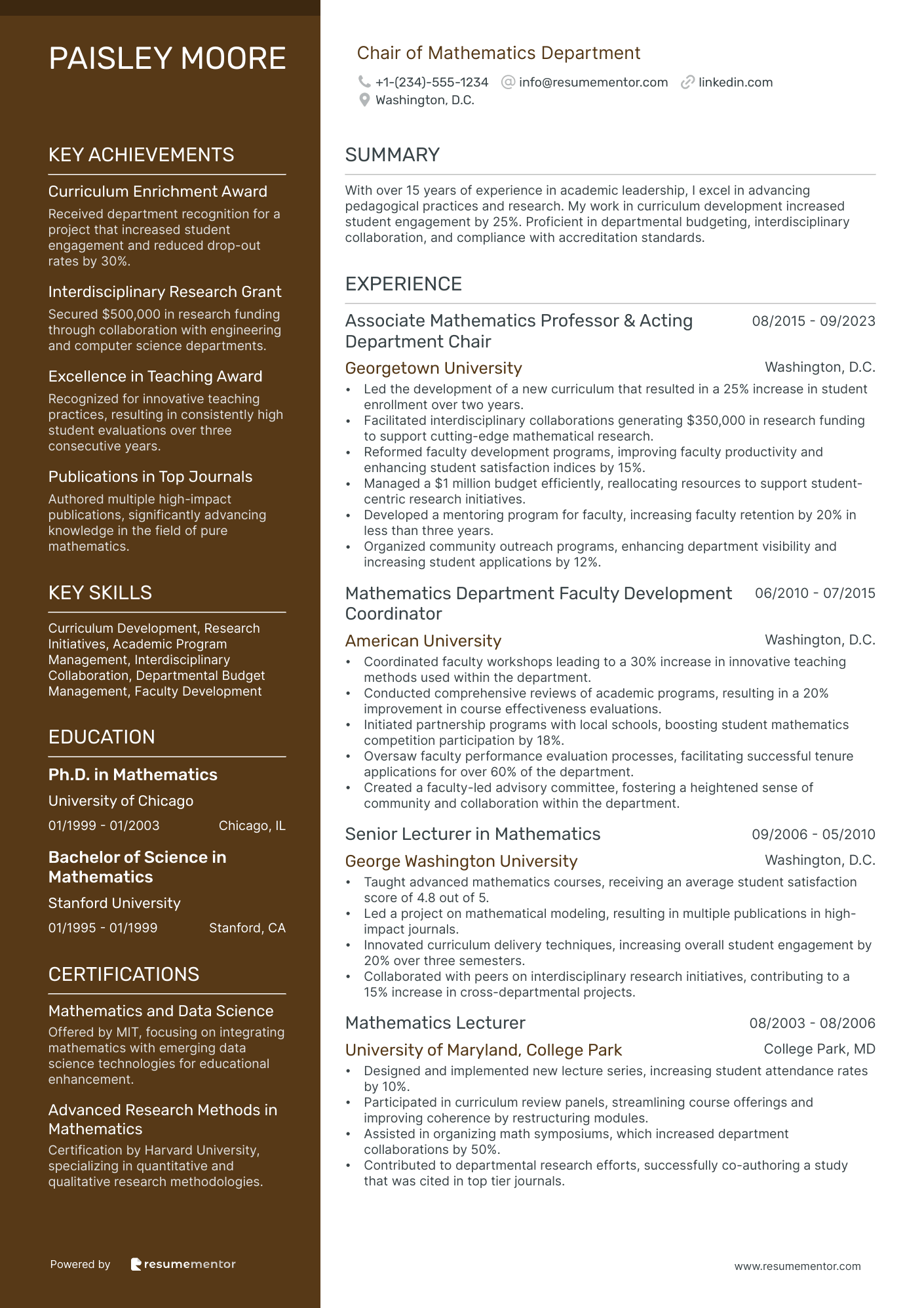
Chair of Mathematics Department
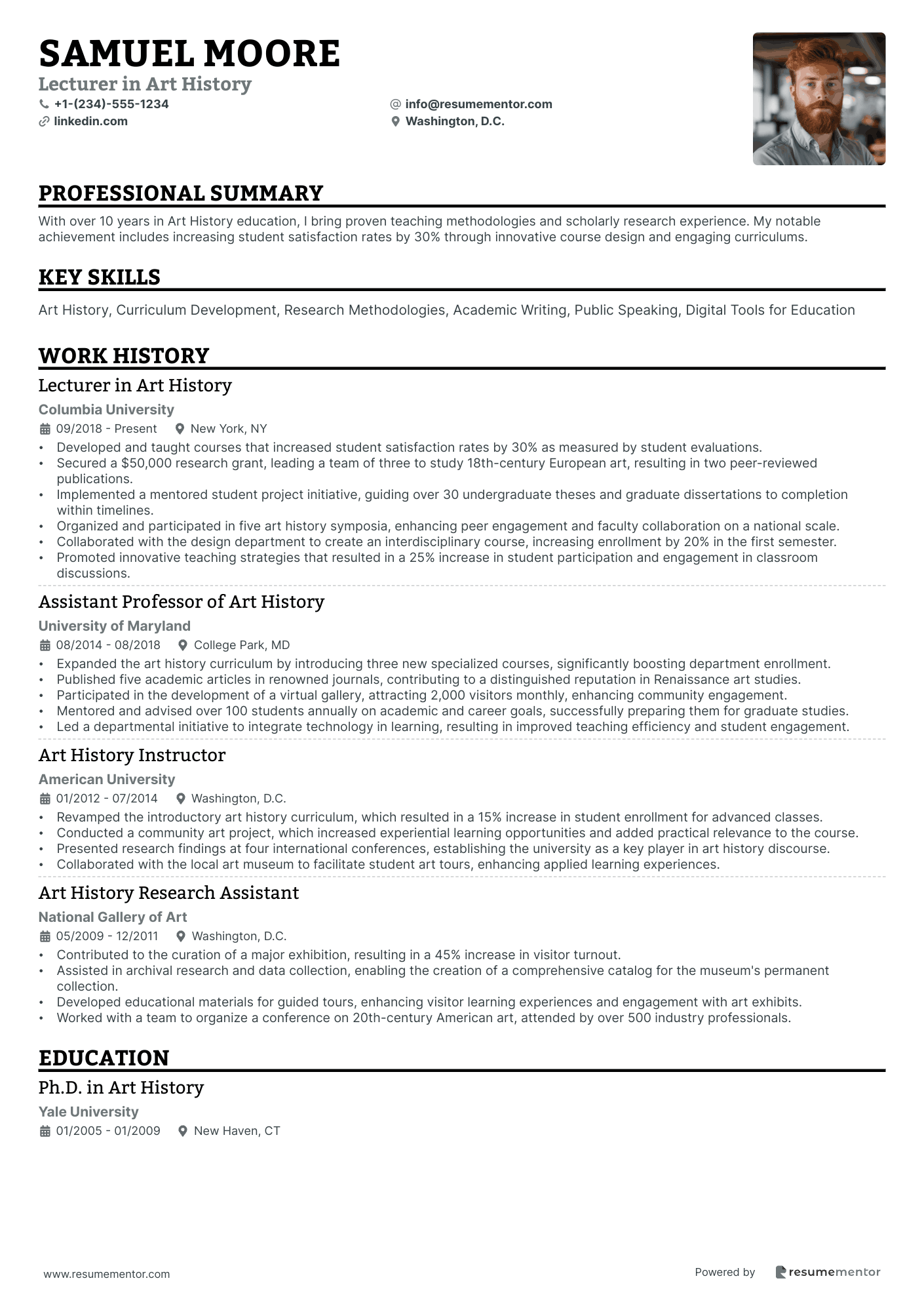
Lecturer in Art History
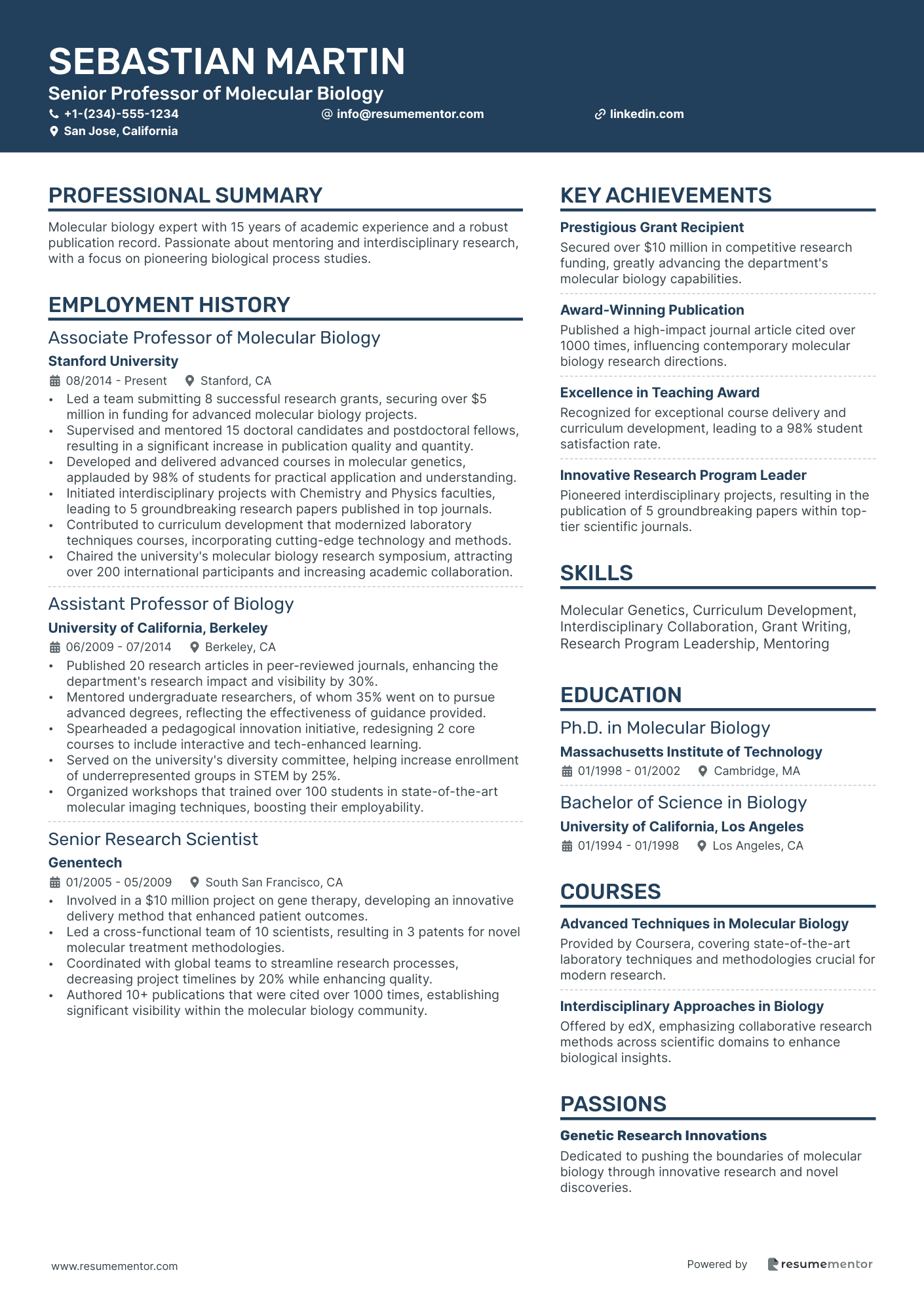
Senior Professor of Molecular Biology
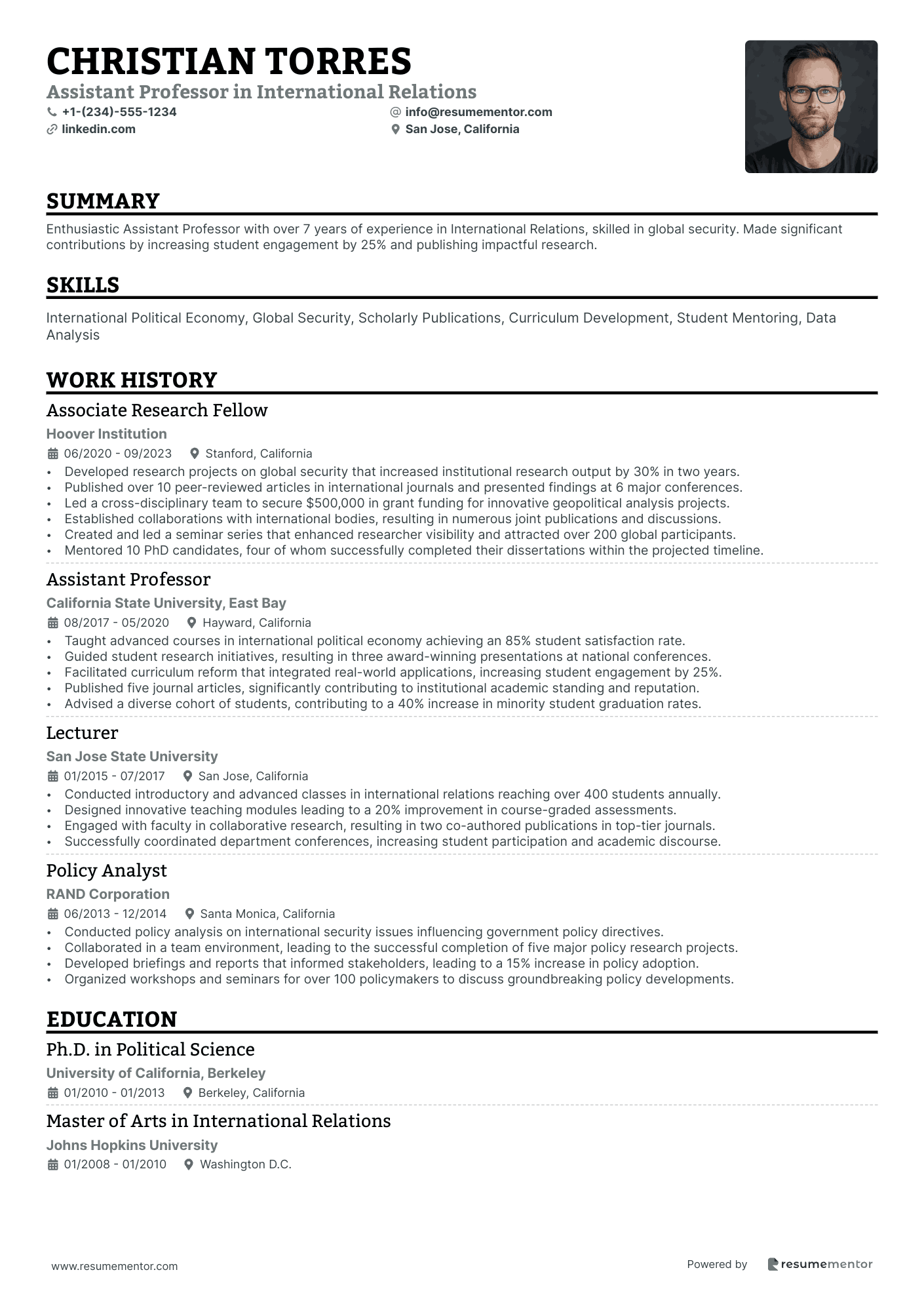
Assistant Professor in International Relations
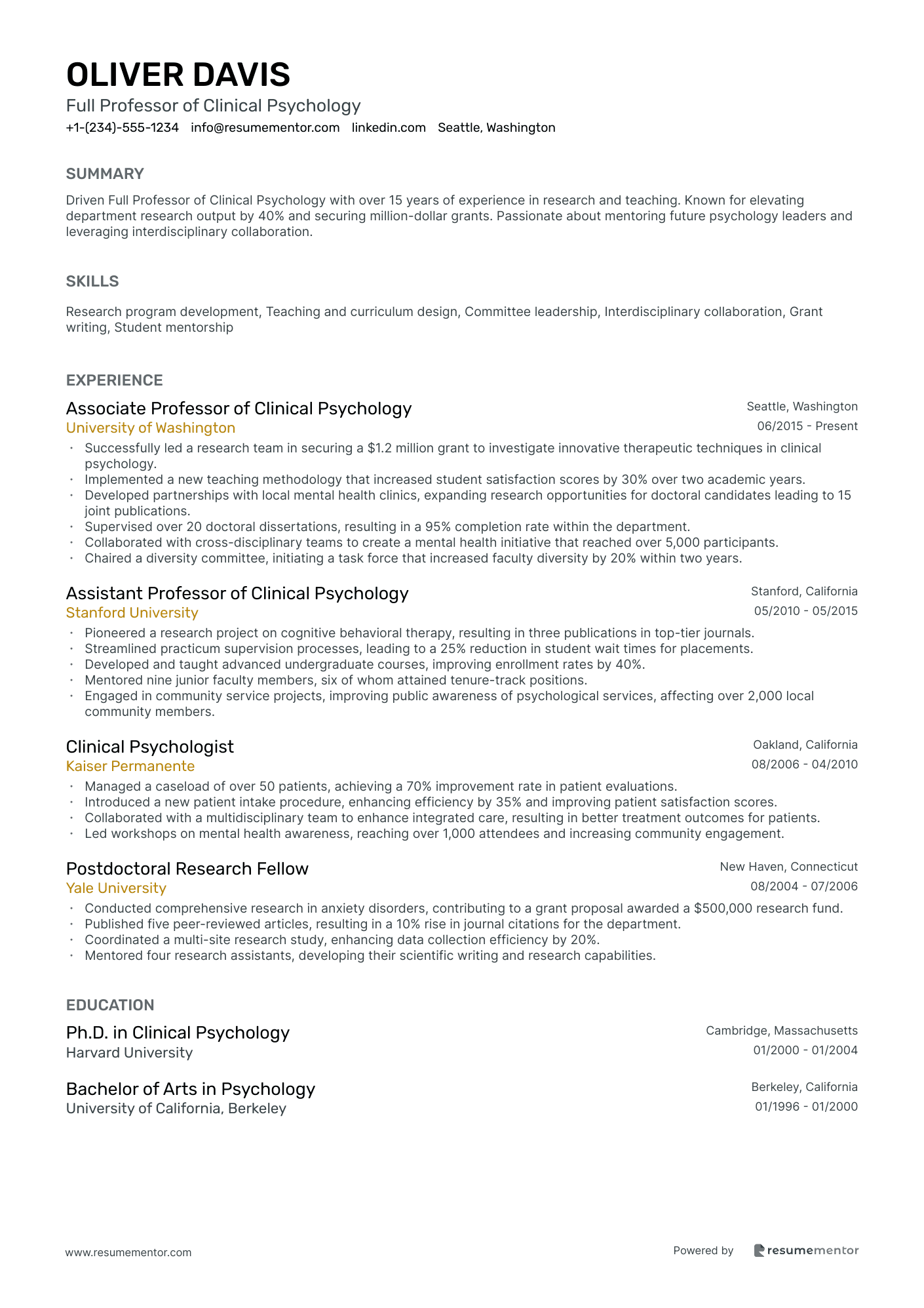
Full Professor of Clinical Psychology

Adjunct Professor of Computer Science resume sample
- •Led a team of software developers in designing a cloud-based solution used by 20 million users, improving system efficiency by 40%.
- •Conducted workshops that enhanced team communication, resulting in a reduction in project delivery times by 25%.
- •Redesigned the internal software deployment process, reducing deployment time from hours to minutes.
- •Mentored junior developers, resulting in a 15% improvement in their code efficiency and a 10% increase in team productivity.
- •Managed and coordinated cross-functional project teams, resulting in a successful product launch six months ahead of schedule.
- •Streamlined coding practices that decreased software bugs by 35%, improving customer satisfaction scores significantly.
- •Developed a groundbreaking algorithm that reduced data processing time by 30%, enhancing overall performance.
- •Collaborated on a predictive analytics project, leading to a 20% increase in system accuracy for users.
- •Created comprehensive training modules for new hires, which improved onboarding efficiency by 45%.
- •Implemented Agile methodologies that enhanced delivery times and increased project success rates by 50%.
- •Guided a team of developers in creating a user interface that led to a 60% increase in user engagement.
- •Contributed to the development of a scalable web platform, enhancing transaction speed by 200%.
- •Successfully automated recurring technical tasks, which resulted in labor cost savings by 25%.
- •Participated in a cybersecurity project that improved system defenses, reducing breaches by 40%.
- •Engaged in cross-departmental collaboration which led to the successful integration of new technologies.
- •Engineered enhancements for the e-commerce platform that improved loading times by 50%, increasing customer retention.
- •Optimized database queries, which led to a 20% reduction in server load and increased efficiency.
- •Collaborated closely with the UX team to refine designs, resulting in a 15% uplift in user satisfaction scores.
- •Devised a code review protocol that increased overall code quality by 30%.
Faculty Member in Marine Biology resume sample
- •Developed and taught six innovative marine biology courses, increasing student enrollment by 35% over four years.
- •Successfully secured $300K in grant funding for research projects on coral reef conservation, resulting in 5 peer-reviewed publications.
- •Led a team of 10 graduate students in underwater biodiversity research, enhancing fieldwork skills and research understanding.
- •Collaborated with interdisciplinary teams to integrate oceanographic data into marine ecosystems studies, resulting in a new course curriculum.
- •Presented research findings at international conferences, enhancing the institution's reputation in marine sciences.
- •Implemented a student-focused mentorship program, improving student retention rates by 20% over two academic years.
- •Published 8 papers on marine biodiversity with a focus on estuarine ecosystems in top-tier journals.
- •Secured a $150K research grant for studying the impact of climate change on coastal marine ecosystems.
- •Developed a student internship program, successfully mentoring over 30 students across five years in marine research.
- •Collaborated with engineers to design a novel water quality sensor, improving the accuracy of marine data collection.
- •Engaged in community outreach programs, educating local schools on marine biology conservation efforts.
- •Coordinated conservation projects that preserved 500 acres of critical marine habitats, significantly enhancing biodiversity.
- •Authored 10 scientific reports on marine ecology, contributing to regional conservation strategies.
- •Led training workshops on sustainable fishing practices for local communities, fostering environmental stewardship.
- •Pioneered a long-term research study on marine species recovery, resulting in actionable data for policy developers.
- •Conducted fieldwork that improved understanding of kelp forest dynamics, published in multiple scientific articles.
- •Designed and implemented a hands-on workshop series, enhancing public awareness of marine conservation by engaging 500 participants.
- •Analyzed water sample data, identifying pollutants and contributing to statewide reports on ocean health.
- •Mentored undergraduate students in marine studies, inspiring careers in environmental sciences.
Associate Professor of Creative Writing resume sample
- •Enhanced the Creative Writing program by integrating contemporary practices, resulting in a 25% increase in student enrollment.
- •Mentored over 100 students, guiding them in their writing projects and academic endeavors to improve their literary skills.
- •Published two fiction anthologies with contributions from diverse voices, showcasing innovative narratives and diverse cultural perspectives.
- •Collaborated with the English department to develop interdisciplinary courses, increasing cross-departmental course offerings by 15%.
- •Spearheaded a community outreach program that brought writing workshops to underserved communities, fostering a broader literary culture.
- •Organized and participated in 20+ literary events, including poetry readings and author visits, enhancing the literary community.
- •location
- •Developed a new course in Contemporary Literature that achieved a 90% student approval rating.
- •Played a key role in revising the Creative Writing curriculum, introducing a focus on diverse literary traditions.
- •Successfully advised the campus literary magazine, which won a regional literary publication award for two consecutive years.
- •Published 6 articles in leading literary journals, contributing to academic discourse in creative nonfiction.
- •Led a faculty team to host annual writing boot camps, which attracted over 150 participants and media attention.
- •Designed and taught workshops that improved student publication rates by 30% in national literary journals.
- •Pioneered a mentorship program that connected students with published authors for one-on-one writing guidance.
- •Curated an annual creative writing exhibit showcasing student work, increasing department visibility and student engagement.
- •Participated in university committees focused on curriculum enhancement and diversity in the literary arts.
- •Introduced a novel writing module that improved student writing proficiency scores by 20% over three semesters.
- •Organized writing contests that encouraged student participation, with over 50 submissions in the inaugural year.
- •Facilitated creative writing workshops, fostering a collaborative environment that inspired peer feedback and support.
- •Collaborated with local literary societies to provide students with real-world literary opportunities and connections.
Visiting Faculty in Anthropology resume sample
- •Led the design and instruction of courses in cultural and biological anthropology, improving student enrollment by 15% over two semesters.
- •Developed comprehensive study programs and learning materials, leading to a 20% increase in student achievement and satisfaction ratings.
- •Mentored 50 students annually, offering personalized academic guidance, resulting in increased retention rates within the anthropology program.
- •Collaborated with colleagues to revamp the cultural anthropology curriculum, which received commendation in the departmental review for improved student outcomes.
- •Organized and led a fieldwork study trip to a local archaeological site, providing students with hands-on experience in modern archaeological practices.
- •Participated in university initiatives to integrate technology in classrooms, increasing online student engagement by 18% through digital platforms.
- •Taught undergraduate courses across multiple disciplines, including applied anthropology, consistently receiving high evaluations from students for course delivery.
- •Innovated new assessment techniques that increased classroom participation by over 30%, fostering an interactive educational environment.
- •Spearheaded a departmental project to incorporate indigenous perspectives into the anthropology curriculum, enriching student knowledge and cultural awareness.
- •Facilitated workshops for faculty on inclusive teaching practices, enhancing departmental commitment to diverse educational strategies.
- •Served as a faculty advisor to the Anthropology Student Association, supporting events that earned university recognition.
- •Developed and delivered engaging lectures on archaeology and its societal impacts, increasing student knowledge retention by 22%.
- •Established a regional conference on cultural anthropology, resulting in heightened collaboration between university departments and external researchers.
- •Reviewed and revised existing course materials, leading to a 17% improvement in student comprehension and success rates.
- •Conducted seminars on the latest trends in anthropology research, attracting a wide array of academic participants from various regions.
- •Assisted in comprehensive anthropological research projects, contributing to published studies that advanced understanding of cultural practices.
- •Performed data analysis on field research which informed key findings, increasing department recognition in national forums.
- •Coordinated interdisciplinary research teams, resulting in a successful grant application for funding further archaeological studies.
- •Presented research at a national conference, enhancing the university's prominence in anthropological scholarship.
Professor of Astrophysics resume sample
- •Led a research group to secure external funding exceeding $2M for groundbreaking studies in cosmology.
- •Mentored 12 graduate students, contributing to their professional growth and co-authoring 20 peer-reviewed papers.
- •Developed an innovative curriculum for advanced stellar astrophysics, increasing student engagement by 25%.
- •Established collaborative projects with interdisciplinary teams, resulting in a 30% increase in published research outputs.
- •Organized national conferences on high-energy astrophysics, attracting over 500 professionals and academics.
- •Conducted research on exoplanets, leading to 15 new discoveries published in top-tier journals.
- •Secured grants totaling $1.5M to fund cutting-edge exploration of high-energy astrophysics phenomena.
- •Collaborated on NASA missions, enhancing analysis techniques that improved data accuracy by 40%.
- •Directed STEM outreach programs, benefiting 300+ local students annually and increasing STEM interest.
- •Contributed to international symposia, sharing findings that influenced global astrophysics research trends.
- •Taught undergraduate courses in cosmology, achieving a 4.8/5 instructor rating in student evaluations.
- •Published 8 peer-reviewed articles on stellar evolution, expanding departmental research output by 15%.
- •Integrated computational methods into teaching, enhancing students' analytical skills in astrophysics.
- •Directed independent research projects for 10 undergraduates, resulting in 3 regional research awards.
- •Conducted high-impact research on galaxy formation, published in Nature journal, increasing citations by 35%.
- •Collaborated with astronomers worldwide, enhancing research methodologies and building robust scientific networks.
- •Acted as a peer reviewer for top journals, maintaining high-quality standards in astrophysics research publications.
- •Participated in complex data analysis, developing algorithms that improved data processing speed by 20%.
Chair of Mathematics Department resume sample
- •Led the development of a new curriculum that resulted in a 25% increase in student enrollment over two years.
- •Facilitated interdisciplinary collaborations generating $350,000 in research funding to support cutting-edge mathematical research.
- •Reformed faculty development programs, improving faculty productivity and enhancing student satisfaction indices by 15%.
- •Managed a $1 million budget efficiently, reallocating resources to support student-centric research initiatives.
- •Developed a mentoring program for faculty, increasing faculty retention by 20% in less than three years.
- •Organized community outreach programs, enhancing department visibility and increasing student applications by 12%.
- •Coordinated faculty workshops leading to a 30% increase in innovative teaching methods used within the department.
- •Conducted comprehensive reviews of academic programs, resulting in a 20% improvement in course effectiveness evaluations.
- •Initiated partnership programs with local schools, boosting student mathematics competition participation by 18%.
- •Oversaw faculty performance evaluation processes, facilitating successful tenure applications for over 60% of the department.
- •Created a faculty-led advisory committee, fostering a heightened sense of community and collaboration within the department.
- •Taught advanced mathematics courses, receiving an average student satisfaction score of 4.8 out of 5.
- •Led a project on mathematical modeling, resulting in multiple publications in high-impact journals.
- •Innovated curriculum delivery techniques, increasing overall student engagement by 20% over three semesters.
- •Collaborated with peers on interdisciplinary research initiatives, contributing to a 15% increase in cross-departmental projects.
- •Designed and implemented new lecture series, increasing student attendance rates by 10%.
- •Participated in curriculum review panels, streamlining course offerings and improving coherence by restructuring modules.
- •Assisted in organizing math symposiums, which increased department collaborations by 50%.
- •Contributed to departmental research efforts, successfully co-authoring a study that was cited in top tier journals.
Lecturer in Art History resume sample
- •Developed and taught courses that increased student satisfaction rates by 30% as measured by student evaluations.
- •Secured a $50,000 research grant, leading a team of three to study 18th-century European art, resulting in two peer-reviewed publications.
- •Implemented a mentored student project initiative, guiding over 30 undergraduate theses and graduate dissertations to completion within timelines.
- •Organized and participated in five art history symposia, enhancing peer engagement and faculty collaboration on a national scale.
- •Collaborated with the design department to create an interdisciplinary course, increasing enrollment by 20% in the first semester.
- •Promoted innovative teaching strategies that resulted in a 25% increase in student participation and engagement in classroom discussions.
- •Expanded the art history curriculum by introducing three new specialized courses, significantly boosting department enrollment.
- •Published five academic articles in renowned journals, contributing to a distinguished reputation in Renaissance art studies.
- •Participated in the development of a virtual gallery, attracting 2,000 visitors monthly, enhancing community engagement.
- •Mentored and advised over 100 students annually on academic and career goals, successfully preparing them for graduate studies.
- •Led a departmental initiative to integrate technology in learning, resulting in improved teaching efficiency and student engagement.
- •Revamped the introductory art history curriculum, which resulted in a 15% increase in student enrollment for advanced classes.
- •Conducted a community art project, which increased experiential learning opportunities and added practical relevance to the course.
- •Presented research findings at four international conferences, establishing the university as a key player in art history discourse.
- •Collaborated with the local art museum to facilitate student art tours, enhancing applied learning experiences.
- •Contributed to the curation of a major exhibition, resulting in a 45% increase in visitor turnout.
- •Assisted in archival research and data collection, enabling the creation of a comprehensive catalog for the museum's permanent collection.
- •Developed educational materials for guided tours, enhancing visitor learning experiences and engagement with art exhibits.
- •Worked with a team to organize a conference on 20th-century American art, attended by over 500 industry professionals.
Senior Professor of Molecular Biology resume sample
- •Led a team submitting 8 successful research grants, securing over $5 million in funding for advanced molecular biology projects.
- •Supervised and mentored 15 doctoral candidates and postdoctoral fellows, resulting in a significant increase in publication quality and quantity.
- •Developed and delivered advanced courses in molecular genetics, applauded by 98% of students for practical application and understanding.
- •Initiated interdisciplinary projects with Chemistry and Physics faculties, leading to 5 groundbreaking research papers published in top journals.
- •Contributed to curriculum development that modernized laboratory techniques courses, incorporating cutting-edge technology and methods.
- •Chaired the university's molecular biology research symposium, attracting over 200 international participants and increasing academic collaboration.
- •Published 20 research articles in peer-reviewed journals, enhancing the department's research impact and visibility by 30%.
- •Mentored undergraduate researchers, of whom 35% went on to pursue advanced degrees, reflecting the effectiveness of guidance provided.
- •Spearheaded a pedagogical innovation initiative, redesigning 2 core courses to include interactive and tech-enhanced learning.
- •Served on the university's diversity committee, helping increase enrollment of underrepresented groups in STEM by 25%.
- •Organized workshops that trained over 100 students in state-of-the-art molecular imaging techniques, boosting their employability.
- •Involved in a $10 million project on gene therapy, developing an innovative delivery method that enhanced patient outcomes.
- •Led a cross-functional team of 10 scientists, resulting in 3 patents for novel molecular treatment methodologies.
- •Coordinated with global teams to streamline research processes, decreasing project timelines by 20% while enhancing quality.
- •Authored 10+ publications that were cited over 1000 times, establishing significant visibility within the molecular biology community.
- •Contributed to the development of a protein synthesis project, resulting in a 40% increase in its efficiency and yield.
- •Collaborated with biochemists to optimize assays, reducing experimental errors by 15% greatly improving overall data reliability.
- •Published 5 research papers, fostering knowledge dissemination and instigating further industry-related molecular investigations.
- •Enhanced research protocols that decreased procedural time by 10%, positively impacting lab throughput and productivity.
Assistant Professor in International Relations resume sample
- •Developed research projects on global security that increased institutional research output by 30% in two years.
- •Published over 10 peer-reviewed articles in international journals and presented findings at 6 major conferences.
- •Led a cross-disciplinary team to secure $500,000 in grant funding for innovative geopolitical analysis projects.
- •Established collaborations with international bodies, resulting in numerous joint publications and discussions.
- •Created and led a seminar series that enhanced researcher visibility and attracted over 200 global participants.
- •Mentored 10 PhD candidates, four of whom successfully completed their dissertations within the projected timeline.
- •Taught advanced courses in international political economy achieving an 85% student satisfaction rate.
- •Guided student research initiatives, resulting in three award-winning presentations at national conferences.
- •Facilitated curriculum reform that integrated real-world applications, increasing student engagement by 25%.
- •Published five journal articles, significantly contributing to institutional academic standing and reputation.
- •Advised a diverse cohort of students, contributing to a 40% increase in minority student graduation rates.
- •Conducted introductory and advanced classes in international relations reaching over 400 students annually.
- •Designed innovative teaching modules leading to a 20% improvement in course-graded assessments.
- •Engaged with faculty in collaborative research, resulting in two co-authored publications in top-tier journals.
- •Successfully coordinated department conferences, increasing student participation and academic discourse.
- •Conducted policy analysis on international security issues influencing government policy directives.
- •Collaborated in a team environment, leading to the successful completion of five major policy research projects.
- •Developed briefings and reports that informed stakeholders, leading to a 15% increase in policy adoption.
- •Organized workshops and seminars for over 100 policymakers to discuss groundbreaking policy developments.
Full Professor of Clinical Psychology resume sample
- •Successfully led a research team in securing a $1.2 million grant to investigate innovative therapeutic techniques in clinical psychology.
- •Implemented a new teaching methodology that increased student satisfaction scores by 30% over two academic years.
- •Developed partnerships with local mental health clinics, expanding research opportunities for doctoral candidates leading to 15 joint publications.
- •Supervised over 20 doctoral dissertations, resulting in a 95% completion rate within the department.
- •Collaborated with cross-disciplinary teams to create a mental health initiative that reached over 5,000 participants.
- •Chaired a diversity committee, initiating a task force that increased faculty diversity by 20% within two years.
- •Pioneered a research project on cognitive behavioral therapy, resulting in three publications in top-tier journals.
- •Streamlined practicum supervision processes, leading to a 25% reduction in student wait times for placements.
- •Developed and taught advanced undergraduate courses, improving enrollment rates by 40%.
- •Mentored nine junior faculty members, six of whom attained tenure-track positions.
- •Engaged in community service projects, improving public awareness of psychological services, affecting over 2,000 local community members.
- •Managed a caseload of over 50 patients, achieving a 70% improvement rate in patient evaluations.
- •Introduced a new patient intake procedure, enhancing efficiency by 35% and improving patient satisfaction scores.
- •Collaborated with a multidisciplinary team to enhance integrated care, resulting in better treatment outcomes for patients.
- •Led workshops on mental health awareness, reaching over 1,000 attendees and increasing community engagement.
- •Conducted comprehensive research in anxiety disorders, contributing to a grant proposal awarded a $500,000 research fund.
- •Published five peer-reviewed articles, resulting in a 10% rise in journal citations for the department.
- •Coordinated a multi-site research study, enhancing data collection efficiency by 20%.
- •Mentored four research assistants, developing their scientific writing and research capabilities.
As a college professor, crafting a compelling resume can feel like solving an intricate puzzle where each piece must fit just right. With years of academic achievements, research, and teaching experience, capturing your essence on paper is challenging. It’s not merely about listing publications or courses taught; it’s about shaping the narrative to resonate with hiring committees.
Using a strong resume template can be a game-changer in this endeavor. A well-structured template organizes your skills and accomplishments, making them easy to comprehend and appreciate. This approach doesn't just save time; it allows you to focus on the elements that truly define your professional identity. Consider exploring these resume templates to discover one that aligns with your objectives.
Your resume serves as more than just a list of qualifications; it’s a story of your professional journey that opens doors and opportunities. Tailoring it to meet academic and professional standards is crucial. Think of it like constructing a mosaic—every piece you include enriches the image of who you are as an educator and scholar.
By approaching your resume with thoughtfulness and strategy, you position yourself to leave a lasting impression. Now, let’s dive into building a resume that not only represents your career accomplishments but also helps you stand out in the academic arena.
Key Takeaways
- Crafting a compelling resume for a college professor involves more than listing achievements; it's about narrating a story that resonates with hiring committees.
- A structured resume template is crucial, as it organizes skills and accomplishments effectively, allowing candidates to focus on their professional identity.
- Tailoring your resume to meet academic and professional standards is crucial, akin to constructing a mosaic where every piece enriches the portrayal of you as an educator and scholar.
- Using a combination resume format highlights teaching skills and academic achievements while allowing for detailed career history, maintaining a balance between teaching and research.
- Incorporating visual elements like modern fonts, maintaining standardized margins, and ensuring compatibility through PDF format enhances the resume's presentation and readability.
What to focus on when writing your college professor resume
A college professor resume should seamlessly convey your academic expertise, teaching skills, and research achievements, helping the recruiter understand your passion for education and your ability to enrich the academic community while positively influencing student learning.
How to structure your college professor resume
- Contact Information: Start with your full name, phone number, email address, and a link to your professional LinkedIn profile—these elements ensure the recruiter can easily connect with you and explore your professional history. Accuracy and professionalism in this section set the tone for your entire resume.
- Professional Summary: Follow with a snapshot of your teaching philosophy and experience, focusing on your academic expertise and research interests that drive your career—this section should be compelling and concise, providing a glimpse into who you are as a professor and your vision for education.
- Education: Next, detail your educational background by listing degrees, majors, and institutions, and highlight any honors or distinctions that underscore your academic commitment—this establishes your intellectual foundation and dedication to lifelong learning.
- Teaching Experience: Then, illustrate your impact on education by detailing the courses you've taught, showcasing student feedback, and sharing innovative teaching methods that set you apart—an engaging description of your teaching journey highlights how you inspire and engage students.
- Research and Publications: Move on to your contributions to your field through significant research projects, publications, and conference presentations that underscore your scholarly achievements—this demonstrates your role as a thought leader and your commitment to advancing knowledge.
- Certifications and Professional Affiliations: Finally, reinforce your dedication to ongoing growth by mentioning relevant certifications and memberships in professional organizations—these showcase your commitment to keeping current with advancements in your field and expanding your professional network.
As we explore each section more in-depth, consider how they collectively form the backbone of a well-structured resume.
Which resume format to choose
Creating a standout resume as a college professor begins with selecting the right format. A combination resume format is most effective for this goal. It highlights your teaching skills and academic achievements while allowing you to detail your career history. This approach reflects the multifaceted role of a professor, balancing teaching and research, ensuring that you convey a comprehensive professional profile.
Your choice of font directly influences the readability and tone of your resume. Modern, clean fonts like Montserrat offer a contemporary look that aligns well with academic professionalism. If you’re aiming for readability with a bit of warmth, Lato is an excellent choice. For a touch of uniqueness, Raleway stands out while maintaining a professional vibe. These fonts help present your qualifications clearly, while offering a modern twist that can capture the attention of academic committees.
Securing your resume’s presentation is crucial, and this is where the filetype comes in. Always save your document as a PDF. This ensures that your layout and fonts remain consistent across all devices and systems, preserving the professional appearance you've meticulously crafted. With academic positions often receiving numerous applications, maintaining this polish is essential.
Paying attention to margins is another key aspect. By keeping them between one inch and half an inch, your resume avoids being cluttered or overly sparse. Adequate margins create an inviting look, guiding the reader effortlessly through your achievements and experiences. This ease of navigation is particularly important in academic settings where attention to detail is highly valued.
By thoughtfully considering each of these elements—format, font, filetype, and margins—you construct a cohesive and visually appealing resume. This attention to detail is crucial in presenting yourself as a polished and competitive candidate in the academic field.
How to write a quantifiable resume experience section
A standout college professor experience section is essential for your resume to shine in the academic world. This section should focus on highlighting your achievements and contributions rather than merely listing job duties, showing potential employers your teaching expertise and academic accomplishments. Structuring it in reverse chronological order helps prioritize your most relevant experience, making your capabilities and the value you bring more apparent.
A key element of crafting an impressive experience section is tailoring your resume to fit the specific job ad. This involves selecting relevant job titles and using action words that align with the job's requirements, which helps show your understanding of and readiness for the role. Including quantifiable achievements makes your experience more compelling by providing concrete results rather than vague claims. Action words such as "developed," "enhanced," "implemented," and "collaborated" can convey your initiative and impact effectively. Aim to include experience from the last 10–15 years, focusing on roles that apply directly to the job you're targeting, even if they were part-time or adjunct.
Here's a well-crafted example:
- •Increased student engagement by 30% through the introduction of interactive case studies and societal issue debates.
- •Secured a $50,000 grant for research on urban sociology, leading to a published paper in a top-tier journal.
- •Mentored 15 graduate students, with 80% completing theses with distinction.
- •Collaborated in the development of an interdisciplinary course on social justice, garnering a 95% positive student feedback rating.
This experience section is effective because it showcases concrete achievements and specific impacts, weaving them together into a clear narrative. For instance, increasing student engagement by 30% illustrates not just your teaching methods but also their effectiveness. Securing a grant highlights your ability to attract funding, a crucial skill in academia, and leads to research outputs that boost your scholarly profile. Mentoring students to high achievements underscores your leadership and instructional capabilities. Meanwhile, collaborating on an interdisciplinary course reflects your adaptability and teamwork skills, backed by a high student approval rating, which emphasizes your teaching effectiveness. Connecting each achievement in this way builds a cohesive story of competence and initiative, directly addressing the needs of the job description.
Skills-Focused resume experience section
A skills-focused college professor resume experience section should clearly highlight your teaching abilities, research skills, and contributions to academia. Start by identifying the key skills relevant to your field and ensure these are evident throughout your descriptions. Use bullet points to neatly showcase your achievements and impact, keeping your language clear and concise. You'll want to emphasize any use of innovative teaching methods, published research work, or contributions to university service.
Begin by listing your employment dates, followed by your job title and workplace. This structured approach helps illustrate your professional journey and what you've accomplished along the way. Concentrate on activities that demonstrate analytical thinking, effective communication, and strong leadership. With strong action verbs, describe your contributions, showcasing the value you've consistently brought to your role. Ensure each bullet is specific and quantifiable, capturing the essence of your work and the skills you offer for future positions.
Associate Professor of Biology
University of State
August 2015 - Present
- Implemented a blended learning approach in undergraduate biology courses, which increased student engagement by 30%.
- Published three research papers in peer-reviewed journals on environmental biology topics.
- Mentored over 50 students in thesis projects, helping them develop critical thinking and achieve academic excellence.
- Developed and led a faculty development workshop series that improved teaching effectiveness across the department.
Efficiency-Focused resume experience section
An efficiency-focused college professor resume experience section should clearly demonstrate your skills in enhancing productivity and improving educational outcomes. Begin by emphasizing actions that showcase how you've streamlined processes, optimized time management, and enriched student learning. Share specific achievements, and quantify your contributions whenever possible. This approach allows potential employers to envision how you can apply these skills to their institution, fostering an innovative educational environment.
As you detail your experience, make sure your points flow naturally. Use lively action verbs to share your achievements in an engaging manner. Consider including innovative teaching techniques or curriculum developments that led to better student outcomes. Ensure each bullet point is connected and highlights how your actions led to more efficient academic practices.
Associate Professor of English
Greenfield University
August 2017 - Present
- Reduced grading time by 30% using a digital system for submissions and feedback.
- Created a new course module, boosting student engagement by 20% through participatory activities.
- Streamlined administrative tasks by developing an online portal that centralized student resources and class materials.
- Led a team to redesign the syllabus, aligning it with industry needs and enhancing course ratings by 15%.
Achievement-Focused resume experience section
An achievement-focused college professor resume experience section should clearly demonstrate the impact of your work on the institution and its students. Begin by listing your position, workplace, and dates of employment to provide context. Highlight how your contributions created positive change, using action verbs to describe accomplishments, improvements, or recognitions. Instead of merely stating duties, emphasize successful outcomes and quantify them when possible to give a clearer picture of your impact.
As you craft the bullet points, consider moments when you excelled beyond standard expectations. Mention any awards received, innovative courses you developed, research projects you led, or outstanding mentoring roles. Using numbers or specific results can make your achievements more compelling. Reflect on how each experience showcased your skills and contributed to both your professional growth and the institution's success.
Associate Professor of Biology
Green Valley University
August 2015 - Present
- Developed a new curriculum for the introductory biology course, leading to a 20% increase in student enrollment over three semesters.
- Led a research project on plant genetics that was published in a top-tier scientific journal, enhancing department visibility.
- Advised the biology club, organizing events that boosted student engagement and membership by 50%.
- Received the 'Outstanding Teaching Award' for innovative teaching methods and high student success rates.
Training and Development Focused resume experience section
A Training and Development-focused college professor resume experience section should showcase your impact on educational growth. Start by clearly stating the type of work and your role within it. Describe your achievements by explaining how you designed, implemented, and evaluated training programs or workshops in an academic setting. Highlight your capacity to identify developmental needs and craft effective curriculum, emphasizing measurable improvements as a result. It's also important to mention any collaborative projects that enhanced program delivery through increased efficiency or effectiveness.
To detail your accomplishments and responsibilities, use bullet points for clarity. Include unique projects you’ve led, improvements in student engagement or learning outcomes, and innovative training methods you introduced. Demonstrating tangible achievements, such as increased course completion rates or student satisfaction scores, reinforces your effectiveness. This structured approach allows potential employers to quickly grasp the impact and value of your contributions.
Professor of Education
State College
August 2015 - May 2023
- Developed over 15 new online courses, increasing enrollment by 20%.
- Led a team to integrate new tech tools, enhancing student engagement by 30%.
- Organized faculty training sessions, resulting in a 90% positive feedback rate.
- Implemented assessment tools to improve learning outcomes by 25%.
Write your college professor resume summary section
A skills-focused college professor resume summary should highlight your strengths seamlessly while engaging the reader. This section serves as a concise introduction, pinpointing your top achievements and unique skills. For an experienced professor, you might consider the following as an example:
This example effectively captures your expertise and what makes you distinct. It uses strong action words like "dedicated" and "proven" to paint a dynamic picture of your capabilities. Including specific accomplishments and skills showcases your unique value, setting a positive tone for your resume.
When describing yourself in a summary, focus on the qualities that truly make you stand out. Reflect on how these set you apart from others in your field. If you're starting your career, a resume objective might be more fitting, emphasizing your career goals and desired position. On the other hand, experienced individuals benefit from a summary highlighting past achievements. A resume profile offers flexibility, incorporating both skills and experience. Meanwhile, a summary of qualifications lists your top accomplishments succinctly. Choosing the right form to match your experience can enhance your resume’s impact, ensuring you make a strong impression. Each approach has its place, but a well-crafted summary truly spotlights your potential and opens doors.
Listing your college professor skills on your resume
A skills-focused college professor resume should effectively integrate your abilities whether they stand alone or are woven into your experience or summary sections. By highlighting your strengths and soft skills, you create an image of a well-rounded professional with strong leadership and communication abilities. Complementing these, hard skills represent the technical expertise specific to your academic discipline.
Incorporating skills and strengths as keywords in your resume increases its visibility and appeal to potential employers, particularly those using applicant tracking systems to identify specific qualifications. Organizing your skills effectively is crucial; here's a streamlined example using JSON format for a standalone skills section:
This section is clear and concise, grouping vital skills that a college professor should possess, such as Classroom Management and Instructional Design. Such organization ensures your competencies stand out without overwhelming readers.
Best hard skills to feature on your college professor resume
When considering hard skills, demonstrate your deep subject knowledge and ability to conduct comprehensive research. These skills communicate your capability to develop curricula and enhance learning experiences. Here are 15 essential hard skills:
Hard Skills
- Classroom Technology
- Learning Management Systems (LMS)
- Statistical Analysis
- Research Methodologies
- Curriculum Development
- Knowledge of Educational Standards
- Academic Writing
- Peer Review
- Quantitative and Qualitative Analysis
- Textbook Development
- Online Teaching Expertise
- Plagiarism Detection Tools
- Assessment Design
- Grant Writing
- Subject Matter Expertise
Best soft skills to feature on your college professor resume
Equally important, soft skills showcase your ability to engage, inspire, and work well with others in the academic community. They highlight personal qualities that enhance teaching and collaboration. Consider including these 15 soft skills:
Soft Skills
- Communication
- Adaptability
- Creativity
- Leadership
- Conflict Resolution
- Empathy
- Team Collaboration
- Patience
- Time Management
- Critical Thinking
- Problem-Solving
- Organization
- Decision-Making
- Cultural Awareness
- Interpersonal Skills
How to include your education on your resume
The education section is a vital component of a college professor resume, highlighting your academic credentials and aligning them with the job you're applying for. It's essential to include only the relevant education that matches the position. Showcase your degrees clearly, and avoid listing unrelated educational experiences. If your GPA is impressive, such as above 3.5, you can choose to include it. Mention honors like "cum laude" to highlight academic excellence. When listing a degree, start with the degree name, followed by the institution, location, and the dates attended. Avoid writing generic education details for a college professor role, and ensure it aligns with the academic field you're targeting.
- •Dissertation focused on 19th-century European diplomatic history.
- •Graduated summa cum laude.
The first example doesn't adequately reflect the specialized skills needed for a college professor role. The second example is excellent because it specifically highlights a PhD in Modern European History, which is directly relevant for a history professor position. It includes graduation honors, adding value to the candidate’s qualifications. Listing a significant dissertation topic can catch the attention of hiring committees, showing expertise in a specific niche.
How to include college professor certificates on your resume
A certificates section is an important part of a college professor's resume. It highlights your additional skills and expertise, setting you apart from other candidates. List the name of the certificate clearly, ensuring it is easy to read. Include the date you received the certificate to provide a timeframe of your continuous learning. Add the name of the issuing organization to underline its credibility. You can also include certificates in the header of your resume to catch attention quickly, like this: "Ph.D. in Education | Certified Online Instructor | Member of the American Educational Research Association."
Having a detailed certificates section is beneficial for showcasing your relevant accomplishments. Here's an example:
This example is effective because each certificate directly relates to teaching and educational leadership, which are vital for a college professor role. Including well-known issuing organizations adds weight to your qualifications. It provides a well-rounded view of your professional development and commitment to education.
Extra sections to include on your college professor resume
Being a college professor is not just about teaching; it's about inspiring future generations, conducting impactful research, and engaging with the academic community. While your core qualifications and teaching experience are crucial, adding certain sections to your resume can showcase a well-rounded personality and a broad range of skills, making you stand out.
Language section — Highlight your language skills to demonstrate your ability to communicate with diverse student populations and collaborate on international projects. Being multilingual can be a significant asset in academic settings, enhancing your teaching and research opportunities.
Hobbies and interests section — Share hobbies and interests to show your personality and potential areas for student mentorship outside of the classroom. Connecting with students over shared interests can foster a more engaged and interactive learning environment.
Volunteer work section — Include volunteer work to show commitment to community service and your willingness to contribute beyond professional obligations. Volunteering can highlight leadership skills, teamwork, and compassion, enriching your profile.
Books section — List books you have authored or contributed to as a way to establish authority in your field and highlight your scholarly achievements. Publishing work demonstrates expertise, commitment to research, and influence in academic dialogue.
Incorporating these sections not only differentiates your resume but also paints a fuller picture of who you are as an educator and a person. Compelling resumes go beyond qualifications to capture the interests and values that drive your professional journey.
In Conclusion
In conclusion, crafting a college professor resume is about more than just listing your achievements; it's about telling your story in a way that reflects your growth and aspirations as an educator. This involves selecting the right format, organizing your skills, and presenting your experiences and education thoughtfully. Every section of your resume, from your professional summary to the additional sections showcasing your extracurricular contributions, plays a role in illustrating the impact you can have in an academic environment. When you highlight both hard and soft skills, you underline your ability to engage students and advance academic knowledge. Make sure that your resume is not only comprehensive but also engaging, with every detail tailored to resonate with your target audience: hiring committees and academic leaders. A well-crafted resume opens doors to opportunities, showcasing your unique talents and preparing you for the next phase of your career. Remember, a strong resume reflects you as a dedicated and dynamic professor capable of inspiring the next generation of learners. As you refine your resume, focus on painting a vivid picture of your professional journey, achievements, and future goals, effectively setting you apart in a competitive academic landscape.
Related Articles

Continue Reading
Check more recommended readings to get the job of your dreams.
Resume
Resources
Tools
© 2026. All rights reserved.
Made with love by people who care.

